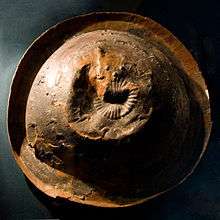Definify.com
Webster 1913 Edition
Dent
1.
A stroke; a blow.
[Obs.]
“That dent of thunder.” Chaucer.
2.
A slight depression, or small notch or hollow, made by a blow or by pressure; an indentation.
A blow that would have made a
dent
in a pound of butter. De Quincey.
Dent
,Verb.
T.
[
imp. & p. p.
Dented
; p. pr. & vb. n.
Denting
.] To make a dent upon; to indent.
The houses
dented
with bullets. Macaulay.
Dent
,Noun.
(Mach.)
A tooth, as of a card, a gear wheel, etc.
Knight.
Webster 1828 Edition
Dent
DENT
, n.1.
Literally, a tooth or projecting point. But it is used to express a gap or notch, or rather a depression or small hollow in a solid body; a hollow made by the pressure of a harder body on a softer; indentation. In this sense, it is in customary use in the United States.2.
A stroke.DENT
,Verb.
T.
Definition 2025
dent
dent
See also: Dent
English

A dented shield.
Noun
dent (plural dents)
- A shallow deformation in the surface of an object, produced by an impact.
- The crash produced a dent in the left side of the car.
- (by extension, informal) A sudden negative change, such as loss, damage, weakening, consumption or diminution, especially one produced by an external force, event or action
- That purchase put a bit of a dent in my wallet.
Translations
shallow deformation in the surface
|
Verb
dent (third-person singular simple present dents, present participle denting, simple past and past participle dented)
- (transitive) To impact something, producing a dent.
- (intransitive) To develop a dent or dents.
- Copper is soft and dents easily.
Translations
produce a dent
develop a dent
Etymology 2
French, from Latin dens, dentis, tooth. See tooth.
Noun
dent (plural dents)
- (engineering) A tooth, as of a card, a gear wheel, etc.
- (Can we find and add a quotation of Knight to this entry?)
Anagrams
French
Etymology
From Middle French dent, from Old French dent, from Latin dentem, accusative of dēns, ultimately from Proto-Indo-European *h₃dénts, *h₃dónts.
Pronunciation
- IPA(key): /dɑ̃/
Noun
dent f (plural dents)
Derived terms
Terms derived from dent
Anagrams
Norman
Etymology
From Old French dent, from Latin dēns, dentem, from Proto-Indo-European *h₃dénts, *h₃dónts.
Pronunciation
Noun
dent m (plural dents)
Derived terms
- brînge à dents (“toothbrush”)
Related terms
- denchive (“gum”)
Old French
Etymology
From Latin dēns, dente
Pronunciation
- IPA(key): /dãnt/
- Rhymes: -ãnt
Noun
dent m (oblique plural denz or dentz, nominative singular denz or dentz, nominative plural dent)
Romansch
Alternative forms
- (Sutsilvan, Surmiran, Puter, Vallader) daint
Etymology
From Latin dēns, dentem, from Proto-Indo-European *h₃dénts, *h₃dónts.
Noun
dent m (plural dents)
Derived terms
- pasta da dents (“toothpaste”)